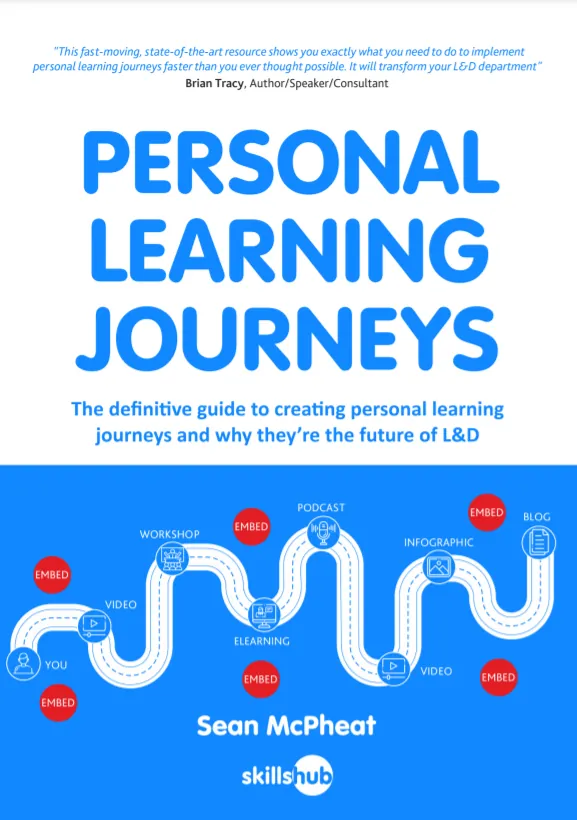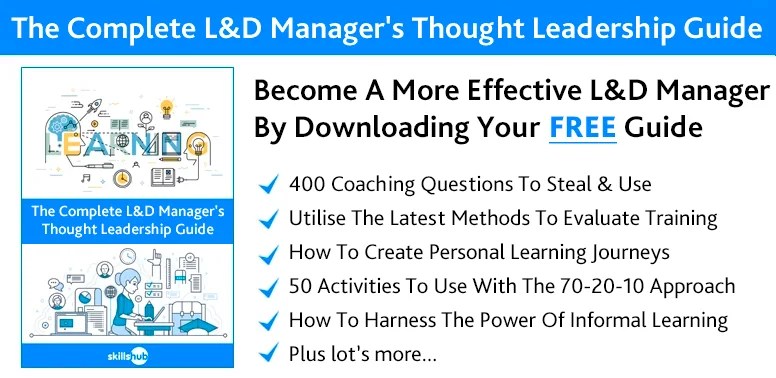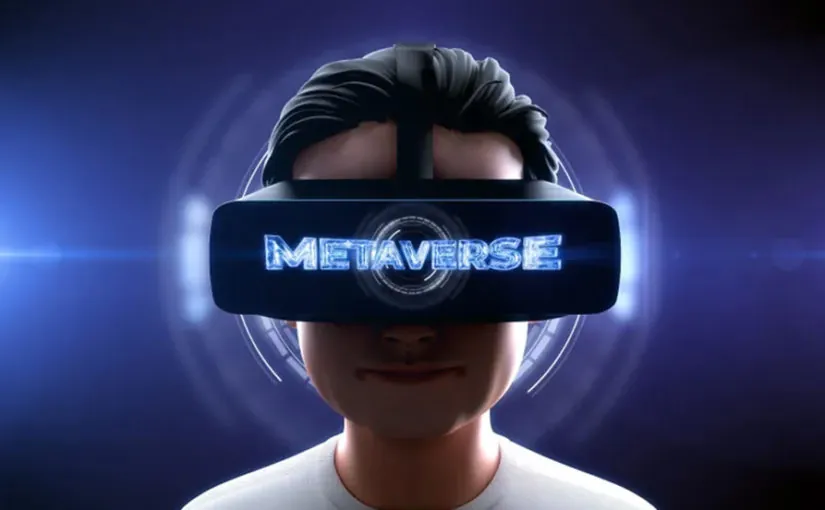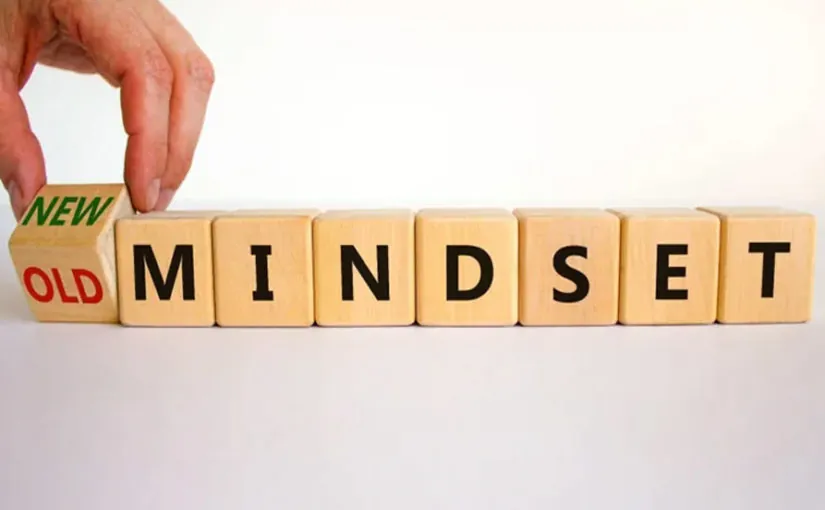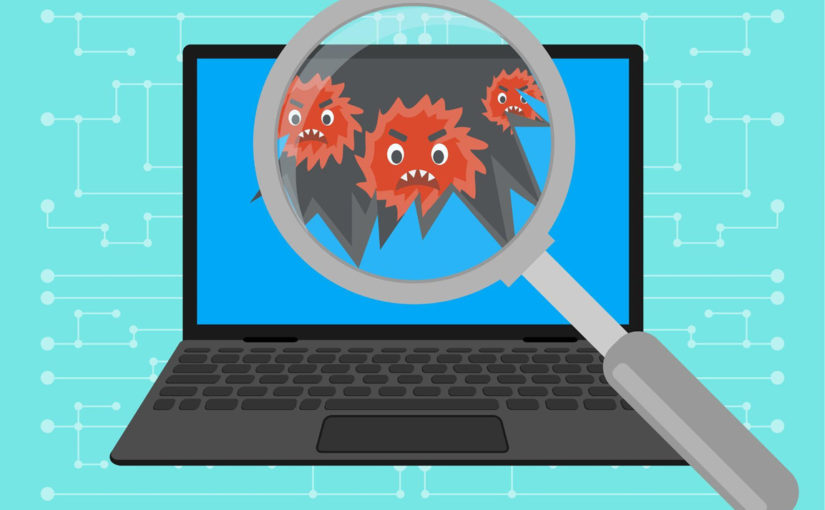
Health eLearning has become increasingly popular in the healthcare industry and as technology continues to advance, the accessibility and flexibility of online learning are revolutionising the way healthcare professionals acquire and apply new skills.
Many eLearning companies are now focusing on delivering specialised training for healthcare professionals. This shift towards online learning platforms tailored to healthcare needs is refining industry practices and enhancing professional development opportunities.
Join us as we explore how health eLearning expertise is shaping the future of healthcare training and contributing to improved patient care outcomes.

The Importance of Health eLearning in Healthcare
At a time when the healthcare industry faces budgetary constraints and rapid technological evolution, while still reeling from the aftermath of a global pandemic, health eLearning has become a valuable resource.
It offers a flexible and efficient method for professionals to stay abreast of the latest medical knowledge and techniques, ensuring high-quality patient care.
Digital transformation in training & development not only facilitates lifelong learning but also democratises education, making it accessible to healthcare professionals worldwide, regardless of their geographical location or work schedules.
The beauty of eLearning is that anyone with access to a tablet, laptop, or desktop computer (or on occasion, a smartphone) can complete online modules containing written information, graphical material, video and audio content, sample quizzes and final assessments.
Moreover, by engaging in eLearning, rather than classroom or clinic-based education, healthcare professionals can free up valuable clinical time and space to devote to training that can only be delivered with hands-on, in-person sessions.
The Role of eLearning in Healthcare Education
The incorporation of eLearning in healthcare education has led to a change in basic assumptions of how knowledge is disseminated, and skills are acquired.
Traditional barriers to education, such as time constraints and physical distance, are removed, allowing for a more inclusive and fulfilling learning experience. Student clinicians can learn at their own pace while ensuring they complete mandatory subjects and courses.
This approach also supports the continuous professional development (CPD) of healthcare workers, enabling them to learn in their spare time and apply new knowledge directly to their practice.
Healthcare is lifelong learning, given the new drugs, treatments, technologies, and protocols which emerge each month. With access to eLearning, no student nurse needs to feel he is being left behind; no junior doctor needs to believe she is missing the latest information.
Here then are the primary benefits of adopting this educative approach:
- It provides readily accessible educational material which can be completed at a pace determined by the student (within reasonable limits.)
- It ensures equal access to the same quality of learning materials, regardless of location or the prestige of the trainee’s organisation.
- It promotes a unified approach to policies and procedures since each student receives the same training.
Advantages of eLearning for Health Professionals
eLearning offers myriad advantages to health professionals, which include but are not limited to:
Flexibility and Accessibility :
Health professionals can access courses anytime, anywhere, allowing them to balance learning with their busy work schedules and personal lives.
Cost-Effectiveness
eLearning reduces the need for physical materials and travel and lowers the costs of training and education for both individuals and organisations.
Trainees who need to restudy a course or retake an assessment can simply do so, without the need to wait for a new in-person training opportunity, which might be costly to arrange.
Up-to-Date Content
eLearning platforms facilitate quick updates to course material, ensuring learners receive the most current information. When new protocols or national guidelines are announced, they can quickly be integrated into current curricula.
Personalised Learning
Adaptive learning technologies allow courses to be tailored to the individual’s pace and learning style, improving outcomes. Modules can be taken in different orders, to suit a trainee’s individual needs and interests.
With eLearning, tests (other than a final assessment) can usually be retried, encouraging learners to enquire into aspects they didn’t understand on first reading, a kind of self-reflection unavailable in rushed, in-person sessions.
Uniformity of Learning
When simple practical lessons are taught in small groups, the quality of the learning depends on the methods of the individual conducting the training. Unwanted variation can occur with different tutors promoting different methods. eLearning does not allow for such variation, meaning that a single protocol can be promoted.
A good example of this latter point is NHS England’s LCAV eLearning tool for nursing, midwifery and care staff, who can take the 25-minute course to understand the new care framework that has been released. This ensures uniformity of understanding of some basic processes and procedures.
Global Collaboration
Online forums and virtual classrooms connect learners worldwide, creating collaboration and the exchange of ideas. Mutual support and encouragement can be promoted, improving the often-diminished morale of trainees.

10 Individual Benefits of E-Learning in Healthcare
Let’s consider the many benefits eLearning can bring to bear in a healthcare setting.
They include:
1: Schedule Flexibility
Flexible working is the way of the world in 2024, and healthcare is no different, with workers able to access eLearning whenever they find the time to complete it. This could be before breakfast, during a lunch break, built-in to the working day, or even at the weekend.
The choice is left to the discretion of the learner, so long as they fulfil requirements before given deadlines.
2: Less Relocation
With time and financial pressures mounting, students may wish to enrol in a course without committing to moving to a different city or country or joining an in-person programme.
Some more theory-based programmes or modules permit distance learning via online courses, enabling a student to take part in a course without a costly trip to a centre of education.
3: Improved Concentration
While some students prefer a more communal learning environment, others find they can achieve improved concentration if they can work from home, a convenient café, or a library where there are fewer distractions and less noise.
4: Reduced Learning Stress
When students can study at their own pace, in the comfort of their own homes, their anxiety and stress levels are diminished. Assessments can occur when they feel genuinely ready to take them, rather than at an arbitrarily predetermined date and time.
5: Allows On-Job Upskilling
If you have a busy and demanding role, as most people do in healthcare, it can be hard to find time to learn new skills, particularly when in-person sessions don’t suit your working patterns. eLearning allows clinicians to add to their knowledge and skills base at a time that’s convenient to them.
6: Content can be Rewatched and Reviewed
It may seem like a small or obvious point, but the ability to repeat a module, or replay a video means that there’s more chance of the educational content sticking. Certainly, knowledge retention is likelier than in real-time demonstrations or in-person sessions with a demanding time limit.
7: Simulation is Enabled
VR simulations or interactive demonstrations can allow students to practise procedures in a VR simulation that could have negative consequences if they were practised for the first time for real.
While such simulations cannot replace hands-on experience, they can provide a great way to memorise processes that must be performed in a certain order, such as drawing blood using a cannula
8: Students can Pursue Individual Passions
Because it is accessible and inexpensive, eLearning can allow students to explore new topics and areas of interest in their spare time, without eating into their clinical time.
9: Patients’ Lives are Improved
When trainees are properly educated, and when processes are adhered to fully, the level of patient care is lifted. Patients aren’t left hoping they get the nurse who follows the procedures to the letter, rather than the one who cuts corners.
eLearning makes it easier to deliver equitable care across healthcare professionals and patient groups.
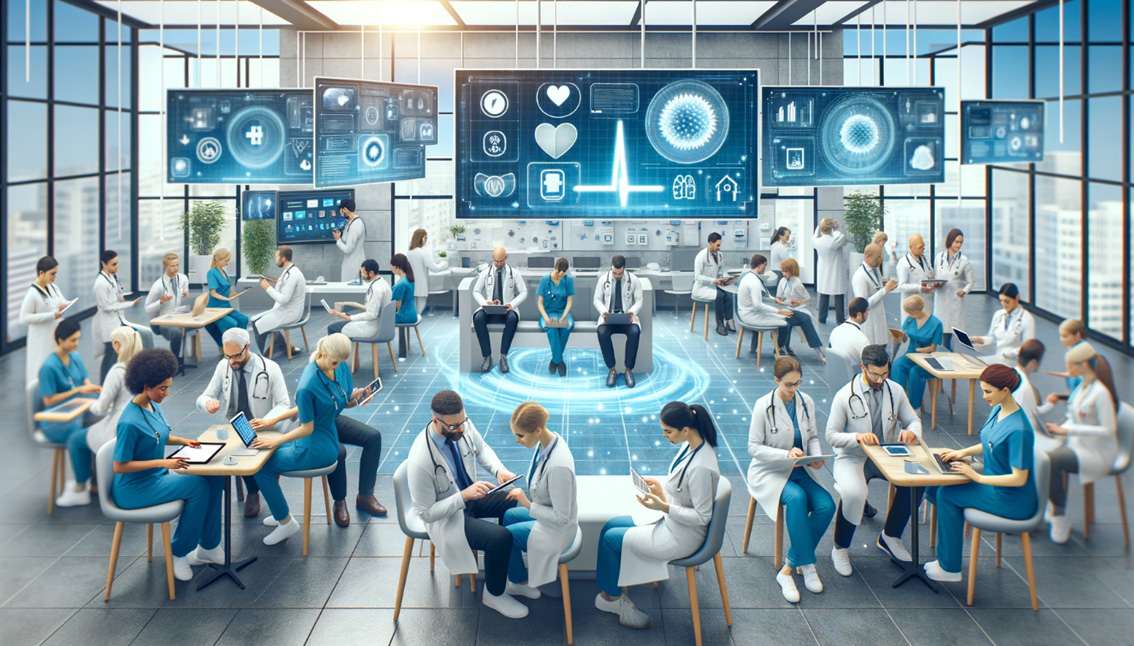
The Future of Healthcare eLearning
The future of healthcare training through eLearning is encouraging, with continuous innovations shaping how knowledge is delivered and absorbed. Here, we’ll break down some of the trends in eLearning innovation.
Trends in eLearning for Healthcare Professionals
From mobile learning to gamification, contemporary trends are making learning more engaging and effective for healthcare professionals. Here are some of the most game-changing innovations:
1: Mobile Learning
More and more eLearning courses are designed to recognise the fact that not everyone has access to a laptop or tablet to study on whenever they wish to. What everyone owns these days, however, is some sort of smartphone.
Online courses are being optimised to work on all three devices (laptop, tablet, smartphone) with students able to log in on several different devices. This allows them, for instance, to begin a module at home on the family laptop, and then complete it on the train on a smartphone.
2: Gamification
Strategies used to promote private sector online training translate just as well to the public sector. Gamification techniques in common use include quizzes, completion scores, badges, certificates and even incentives like additional days off, money-off coupons or even cash bonuses.
Although it may be early days for healthcare organisations using gamification, the potential to leverage competitiveness, the desire for appreciation, or the pleasure of winning a prize, is there.
3: Patient Self-Monitoring
Many conditions such as high blood pressure and diabetes, need to be regularly monitored at home by patients. eLearning courses can be devised to help them conduct such data analytics effectively, including the use of specific devices, and understanding what the resulting data means. It can also train patients to report data accurately and call for assistance if the results are of concern. Best of all, it’s always accessible, so that patients can refresh their memories if they forget anything.
eLearning can be used as a first port of call, training patients with critical, ongoing conditions to look for warning signs of stroke, cardiac arrest, seizures, and other serious adverse events. This intervention could be the difference between life and death.
Online Symptom Checkers
Taking the pressure off in-person healthcare services, online symptom checkers can be a first port of call for patients concerned that they might be developing a condition. Online healthcare portals can provide up-to-date information and signpost patients to appropriate services.
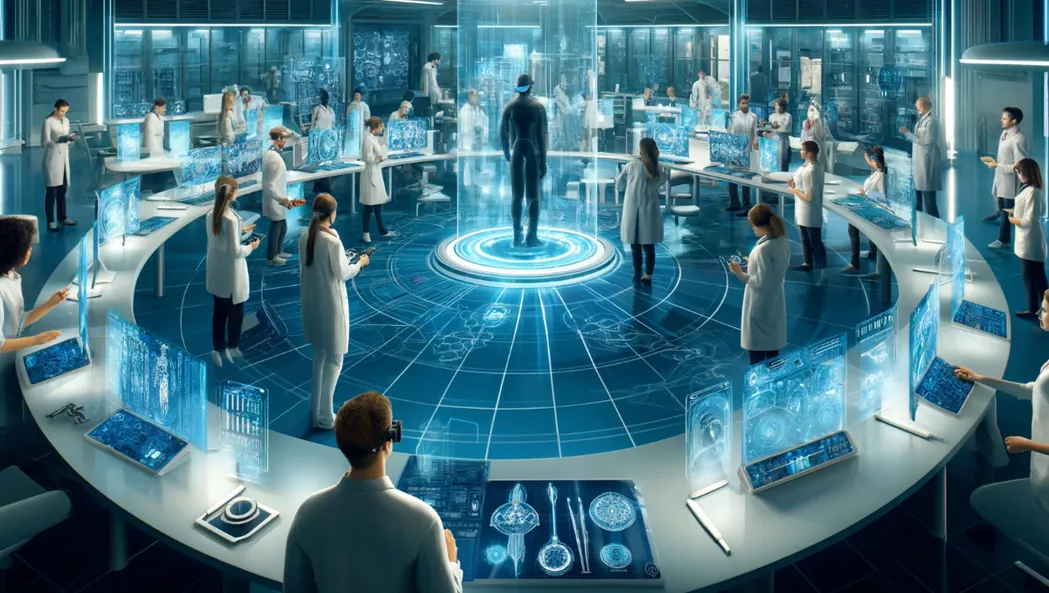
Emerging Technologies in Healthcare Education
Innovations in eLearning are radically changing the training of healthcare professionals, making education more accessible, flexible, and interactive than ever before.
These advances enhance the learning experience while addressing the challenges of modern healthcare education. They satisfy the need for continuous learning in the face of rapidly evolving medical knowledge and practices.
Here’s how these innovations are making a difference:
Virtual and Augmented Reality (VR/AR)
Virtual and Augmented Reality technologies are transforming healthcare education by providing immersive learning experiences that simulate real-world medical scenarios and procedures.
This hands-on approach allows learners to practise and hone their skills in a safe, controlled environment. For example, surgical trainees can perform virtual surgeries, experiencing the look and feel of actual operations without the risks associated with practising on real patients.
Artificial Intelligence and Adaptive Learning
Artificial Intelligence (AI) is personalising the eLearning experience in healthcare education. Adaptive learning systems use AI to analyse learners’ performance and tailor the content to fit their learning pace, strengths, and weaknesses.
This ensures that each learner receives a customised learning experience, improving outcomes and efficiency.
If this is something you are looking to explore, we can work with you to create bespoke eLearning that sticks and is effective for you and your team.
Big Data and Learning Analytics
Big data and learning analytics are playing a crucial role in understanding how healthcare professionals learn and how to improve eLearning courses.
By analysing large sets of data on employee engagement, performance, and progress, educators can identify trends, predict learning outcomes, and provide targeted interventions to help learners succeed.
In this way courses improve, pass rates rise, and learning quality is enhanced.
Social Learning and Collaboration Tools
eLearning is becoming more collaborative, reflecting healthcare’s culture of teamwork and shared responsibility.
Social learning platforms allow professionals to learn from each other, share experiences, and discuss complex cases or new developments in medicine.
This approach not only enhances learning but also builds a sense of community among learners.
Cloud-Based Learning Management Systems (LMS)
Cloud-based LMSs provide scalable, flexible platforms for delivering eLearning content, allowing anywhere, anytime learning.
They support a wide range of multimedia content and interactive activities, from video lectures and podcasts to interactive simulations.
Cloud-based systems also ensure that learning materials are kept up to date, which is critical in the fast-evolving field of healthcare.
eLearning and Healthcare: A Perfect Fit
As the demand for skilled healthcare professionals continues to grow, eLearning has become a key tool in meeting this need. Used in tandem with the necessary hands-on training, eLearning is a great way to inculcate a culture of continuous professional development.
Through specialised eLearning content and platforms, professionals can engage in virtual training that enhances their skills, knowledge, and ability to provide exceptional care. Better yet, they can do all this from the comfort of an armchair.
The future of healthcare education lies in using online solutions to create a well-informed, proficient, and adaptable workforce.
Skillshub has a host of eLearning content available on our comprehensive eLearning platform.
And for an immersive learning experience, why not consider our Virtual Training.
